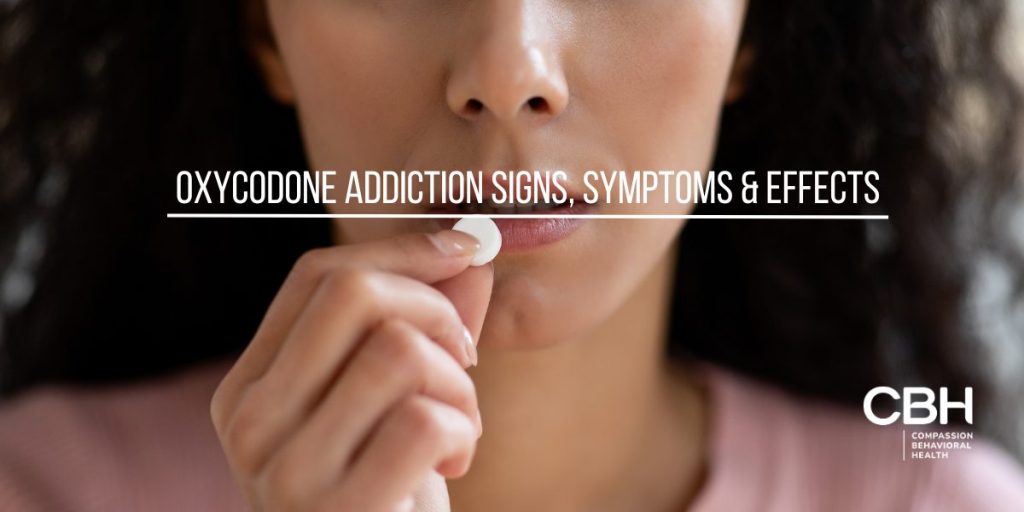Oxycodone addiction is a serious and growing problem in today’s society. To effectively address this issue, it is crucial to understand the symptoms associated with this form of addiction. By recognizing the signs of oxycodone addiction, individuals can seek the necessary help and support to overcome it. This article aims to provide an in-depth understanding of these symptoms, shedding light on the physical, behavioral, and psychological aspects of oxycodone addiction.
The Nature of Oxycodone and Its Uses
Oxycodone is a powerful opioid pain medication that is commonly prescribed to relieve severe pain. It belongs to a class of drugs known as narcotic analgesics and works by binding to opioid receptors, effectively reducing pain perception. Due to its potent nature, oxycodone is often prescribed for patients experiencing chronic pain, post-surgical pain, or pain associated with certain medical conditions.
Oxycodone is derived from the opium poppy plant and has been used for centuries to alleviate pain. Its effectiveness in managing severe pain has made it a valuable tool in the medical field. The drug is available in various forms, including immediate-release tablets, extended-release tablets, and liquid solutions, allowing healthcare professionals to tailor the treatment to the specific needs of each patient.

When taken as prescribed, oxycodone can provide much-needed relief for individuals suffering from excruciating pain. It plays a crucial role in managing pain and improving the quality of life for those with debilitating conditions. By targeting the opioid receptors in the brain and spinal cord, oxycodone can help alleviate pain signals, allowing patients to function and engage in daily activities more comfortably.
The Medical Purpose of Oxycodone
When used properly and under the guidance of a healthcare professional, oxycodone can be an effective tool in medical treatment. It is often prescribed to patients recovering from major surgeries, such as open-heart surgery or joint replacement, to help manage the intense pain that follows these procedures. Additionally, individuals with chronic conditions, such as cancer or degenerative diseases, may rely on oxycodone to alleviate their ongoing pain and improve their overall well-being.

Oxycodone is known for its rapid onset of action, providing quick relief to patients in need. This characteristic makes it particularly useful in emergency situations, where immediate pain relief is crucial. Healthcare providers carefully assess each patient’s pain levels and medical history before prescribing oxycodone, ensuring that the benefits outweigh the potential risks.
The Potential for Oxycodone Misuse
However, oxycodone also carries a high potential for misuse and addiction. This is primarily due to its powerful effects on the brain’s reward system, causing feelings of euphoria and relaxation. Individuals who misuse oxycodone by taking it in higher doses or more frequently than prescribed, or those who use it without a prescription, are at a heightened risk of developing an addiction.
It is essential to recognize the signs of oxycodone misuse and addiction to prevent the devastating consequences it can have on individuals and their families. Common signs include a strong craving for the drug, the inability to control or reduce its use, and withdrawal symptoms when attempting to stop. Seeking professional help and support is crucial for those struggling with oxycodone addiction, as it is a complex condition that requires comprehensive treatment.
Healthcare providers and regulatory authorities have implemented various measures to address the issue of oxycodone misuse. These measures include stricter prescription guidelines, increased monitoring of prescriptions, and educational campaigns to raise awareness about the potential risks associated with the drug. By promoting responsible prescribing practices and educating the public, efforts are being made to strike a balance between providing adequate pain relief and minimizing the risk of misuse and addiction.
Identifying the Physical Symptoms of Oxycodone Addiction
The physical symptoms of oxycodone addiction can manifest in various ways. These signs may not be immediately evident but understanding them can aid in early detection and intervention.
Oxycodone addiction is a serious condition that can have significant impacts on an individual’s physical well-being. Recognizing the physical symptoms associated with this addiction is crucial in order to provide appropriate support and treatment.
Changes in Physical Appearance
One of the noticeable signs of oxycodone addiction is a change in physical appearance. Individuals may experience sudden weight loss or gain, often due to changes in appetite and metabolism associated with drug use. This can be attributed to the effects of oxycodone on the body’s natural processes.

In addition to changes in weight, individuals addicted to oxycodone may exhibit poor hygiene, neglecting personal grooming habits that were once important to them. This can be a result of the drug’s impact on cognitive function and motivation, making it difficult for individuals to prioritize self-care.
Furthermore, prolonged use of oxycodone can lead to skin-related issues. The drug can cause dryness, itching, and rashes, which can further contribute to changes in physical appearance.
Health Complications from Oxycodone Addiction
Long-term oxycodone addiction can lead to severe health complications. Prolonged use of the drug can cause respiratory problems, cardiovascular issues, and damage to vital organs. These health complications can have a significant impact on an individual’s overall well-being.
Individuals addicted to oxycodone may experience difficulties breathing, chest pain, elevated heart rate, and other related symptoms. These symptoms are often a result of the drug’s depressant effects on the central nervous system, which can lead to respiratory depression and cardiovascular strain.
In addition to respiratory and cardiovascular problems, oxycodone addiction can also cause damage to vital organs such as the liver and kidneys. The drug’s toxic effects can result in organ dysfunction and failure, further exacerbating an individual’s health complications.

It is important to note that the physical symptoms of oxycodone addiction can vary from person to person. Some individuals may exhibit all of these symptoms, while others may only experience a few. It is essential to consider the individual’s overall health and medical history when assessing the physical effects of oxycodone addiction.
Recognizing the Behavioral Symptoms of Oxycodone Addiction
In addition to the physical symptoms, oxycodone addiction also affects an individual’s behavior and interactions with others.
Understanding the behavioral symptoms of oxycodone addiction is crucial in identifying and addressing the problem. These symptoms can manifest in various ways and have significant impacts on an individual’s personal and professional life.
Shifts in Mood and Personality
One of the most common behavioral symptoms of oxycodone addiction is a noticeable shift in mood and personality. Individuals may experience intense mood swings, ranging from euphoria during drug usage to depression and irritability during withdrawal periods.
These mood changes can significantly impact personal relationships and overall wellbeing. Loved ones may struggle to understand and cope with the sudden shifts in behavior, leading to strained relationships and conflicts.

Moreover, the individual themselves may find it challenging to maintain stable relationships due to their unpredictable emotional state. They may isolate themselves from friends and family, feeling ashamed or guilty about their addiction.
Additionally, the constant cycle of euphoria and withdrawal can lead to a loss of self-identity. The individual may struggle to recognize their own emotions and may become detached from their true personality.
Social and Professional Consequences
Oxycodone addiction can also lead to significant social and professional consequences. Individuals may withdraw from social activities, preferring to spend their time alone or in the company of fellow drug users.
Their addiction becomes the focal point of their life, overshadowing other interests and activities they once enjoyed. As a result, they may lose touch with friends and miss out on important social events and milestones.
In the workplace, addiction can result in decreased productivity, absenteeism, and an overall decline in job performance. The individual may struggle to meet deadlines, make poor decisions, and have difficulty concentrating on tasks.
Furthermore, the physical and psychological effects of oxycodone addiction can impair an individual’s cognitive abilities, making it challenging to perform at their best. This decline in job performance can lead to strained relationships with colleagues and supervisors, and ultimately, job loss.

Moreover, the financial strain caused by addiction can further exacerbate the social consequences. The individual may struggle to meet their financial obligations, leading to debt, eviction, or even homelessness.
It is essential to recognize and address these behavioral symptoms promptly to provide the necessary support and intervention for individuals struggling with oxycodone addiction. By understanding the far-reaching consequences of addiction, we can work towards creating a supportive environment that promotes recovery and wellbeing.
Understanding the Psychological Symptoms of Oxycodone Addiction
In addition to the physical and behavioral symptoms, oxycodone addiction can have a profound impact on an individual’s psychological well-being.
Mental Health Disorders and Oxycodone Addiction
Research has indicated a strong correlation between oxycodone addiction and the development or exacerbation of mental health disorders. Individuals struggling with addiction may experience increased anxiety, depression, or even the onset of psychiatric disorders. Recognizing these psychological symptoms is crucial for providing appropriate treatment and support.
Cognitive Impairments from Oxycodone Use
Prolonged oxycodone use can lead to cognitive impairments, affecting an individual’s ability to think clearly, concentrate, and remember important information. These cognitive symptoms can greatly impact work or academic performance, as well as overall daily functioning.
The Path to Oxycodone Addiction Recovery
While oxycodone addiction is a challenging battle, recovery is possible with the right support and treatment.
The Importance of Professional Help
Seeking professional help is a crucial step in the path to oxycodone addiction recovery. Healthcare professionals specializing in substance addiction treatment can provide comprehensive assessments, personalized treatment plans, and ongoing support throughout the recovery process.
Treatment Options for Oxycodone Addiction
Treatment options for oxycodone addiction vary depending on the individual’s needs and preferences. These may include detoxification, counseling, psychotherapy, support groups, and medication-assisted treatment. Choosing an approach that addresses both the physical and psychological aspects of addiction increases the likelihood of successful recovery.
In conclusion, understanding the symptoms of oxycodone addiction is essential for early detection and effective intervention. By recognizing the physical, behavioral, and psychological signs associated with this form of addiction, individuals and their loved ones can take the necessary steps towards recovery and a healthier, drug-free life.
Oxycodone Abuse Treatment Plan at Compassion Behavioral Health
At Compassion Behavioral Health, we recognize that the journey from addiction to recovery is deeply personal and unique to each individual. With a holistic approach, our team of experienced professionals offers evidence-based treatments tailored to address the multifaceted challenges posed by oxycodone addiction. We believe that recovery extends beyond mere physical detoxification and delve deep into the underlying emotional and psychological triggers of addiction. Our commitment is not just to help our clients free themselves from the chains of addiction but also to empower them with the skills and resilience required for sustained recovery. Through individualized therapy, support groups, and a caring community, we aim to transform lives, restore hope, and pave the path to a brighter, healthier future. Call us to get a free assessment today.




